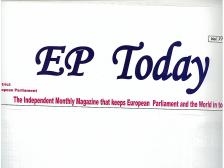News
EP Today published the article by Emil Stoyanov: The Battle for Schengen. More Europe or less Europe in this decade

EP Today published:
The second week of June was marked by the European debate on Schengen, which was so intense and strategic for the common European future that it managed to oust even the dramatic topic of the financial crisis in Greece, Portugal and Ireland.
At first glance, the debate concerned the entry of Bulgaria and Romania into the Schengen area but the debate was actually much deeper; it raised the question of the future protection of European borders in general. The immigration pressures which Europe is facing today can only be compared to the stresses of the global financial crisis. Both phenomena threaten the very functioning of major systems of the European Union. It became clear that, as in the case of the financial crisis, the European Union has no developed strategy or response mechanism for the current immigration crisis.
The debate stems from the Accession Treaties of Bulgaria and Romania that stipulate that both countries should join the Schengen area in 2011.
To do so, they must fulfil a number of technical criteria that apply to all other European countries. It is as simple as that. The governments of both Bulgaria and Romania embraced this as an important task by which they could strengthen their domestic and foreign policy positions. They worked hard, invested millions of Euros from their own or EU funds and in fact managed to fulfil these technical criteria. The rapporteur for the European Parliament, Carlos Coelho, a Portuguese parliamentarian from the European People's Party, clearly stated in his report that the criteria have been met. Apropos, the majority of MEPs and the examiners from various European institutions are also convinced that the technical criteria have been fulfilled. During the plenary debate in Strasbourg, all arguments in favour of the accession of the two countries to the Schengen area were put forward diligently by Coelho and at least two dozen other parliamentarians. The most important arguments are that there are well-established criteria; these have been met and therefore the accession of Bulgaria and Romania should proceed, as in the case of other countries in the past, according to the Treaty and without the need for any political modalities. Opponents to the accession of Bulgaria and Romania numbered less than one fifth of those in the plenary hall and their arguments ranged from the emotional to the political bordering on the abstract. Concerns were expressed that both countries have high levels of organized crime, corruption and poorly reformed judicial systems. These are things that cannot be measured accurately and belong more in the field of political debate. It seems the parliamentarians expressing those opinions, mainly Dutch and UK members, were trying to resolve their own internal party political problems and used the debate on Schengen for this purpose. Even the Roma were invoked, while the fact that Bulgaria has had a visa-free regime with European countries for ten years, which means no current obstacles to the free movement of Roma people anyway, was conveniently not mentioned. A speech by the Dutch MEP Wim van de Camp was rather curious. He said: "I remember photographs of the border between Bulgaria and the Ukraine. The Ukrainian customs men apparently were corrupted and let people into the Union, who shouldn't be let in." He had not even bothered to observe that no such border exists, or has ever existed. Interestingly, a geographical divide emerged between those MEPs who were for and those against accession. The East and the South tended to support while the West and the North tended to oppose the accession of Bulgaria and Romania. Ultimately, the European Parliament recommended the accession of Bulgaria and Romania with 487 votes in favour to 77 votes against and thus proved worthy of its political role as the voice of European citizens.
The real problem did not relate to the readiness of Bulgaria and Romania but to something entirely different. This discussion was taking place at a time of unprecedented immigration pressure in two parts of Europe, the first one covering Italy and France as a consequence of the North African revolutions, and the second one being in Greece following the last fifteen restless years in Iraq, Pakistan, Afghanistan and, to a lesser extent, Turkey. A traditionally louder media in Italy and France makes the problem there seem bigger but, in my opinion, the tension in Greece is not to be underestimated.
It is precisely here that European solidarity might start to crumble. In this particular case, the Southern countries immediately requested assistance from the Union which the Northern countries nearly refused on the grounds that, under the Schengen treaty, each country is to protect its own borders. Formally, of course, this is correct. This attitude, however, seems a little short-sighted since the Schengen borders will be penetrated at certain precise spots which even larger countries such as Italy and France will struggle to contain. It is even more difficult for the eleven million population Greece, which for years has been facing a stream of immigrants who break through its defences. Official statistics suggest around 250 people enter the Schengen area illegally every day but it is probable the figure is higher. The problems for Bulgaria would be exactly the same. Together, Bulgaria and Greece are the two most distant European and Christian countries and it is they who will have to guard the Schengen border from the immigration flow from Asia and Africa. Their combined population is slightly less than twenty million while the closest countries in South-Eastern Europe that pose an immigration threat have a population of more than three hundred and fifty million. The common border of Bulgaria and Greece with Turkey is around 420 kilometres, equally divided between Bulgaria and Greece. Given the fact that Turkey has a tendency towards Islamisation, and probably the same will happen in North Africa, it has to be acknowledged that Europe faces serious border problems ahead.
To those interested in historical analogies I will remind that things were not that different approximately 600 years ago. Through the Bosphorus, a flood of Islamic people came, which the former Bulgaria and Byzantium were unable to halt and, 60 - 70 years later, Suleiman the Magnificent reached as far as Vienna. I admit that the analogy is exaggerated, but the fact remains.
All this means that the European institutions should, as soon as possible, set up a mechanism of Schengen borders protection since it is becomming clear that the old criteria under the Treaty will be becoming ever less efficient. They were suitable for the nineties, when they were applied only to protect the border between Germany and Poland or between Austria and Hungary. Today's problems are very different and we need new solutions as the old ones no longer work, just as the eurozone mechanisms are not working because they are inadequate in time of crisis.
Probably driven by similar considerations, the Council of Ministers of Home Affairs came up with a decision to postpone the accession of Bulgaria and Romania. The formal reason stated was a report on the two countries expected in July. This decision amounted to a violation of the accession treaties of Bulgaria and Romania since it added political requirements to the existing technical requirements. This decision also illustrated something else: reports (in this case coming from Coelho and the European experts) have little significance. It is the political fashion that is important. And in times of crisis, enlargement is not the current fashion. Clearly, in the coming years, the motto of the European People's Party for more Europe will not be very topical. Apropos, for Bulgarian citizens this has no practical significance because they have enjoyed free movement within the European Union for the last 10 years and have been able to find employment in most European states. This restriction is much more directed at people wanting to immigrate into Europe.
The most important thing now is to use the situation of general discomfort to all concerned and to create an additional mechanism, possibly on the basis of FRONTEX, in order to provide an enhanced presence in the neuralgic regions of Europe. One such region is undoubtedly the Bulgarian-Turkish border, where the presence of pan-European security forces must be visible and convincing. In this way, not only can immigration flows be contained but we can also combat illegal drugs and smuggling routes that usually follow illegal immigration routes and deserve an equally uncompromising stance.
More News:
» 22/06/2012 | 18:57 News - Digital Agenda Assembly
» 18/06/2012 | 17:01 News - Throughout November – New National strategy for Bulgarians, who live abroad
» 18/06/2012 | 11:13 News - Emil Stoyanov's interview for '24 hours' newspaper: It is important not to brag against the country, but to work for solutions.
» 06/06/2012 | 14:15 News - The Committee on Culture of the European Parliament in Plovdiv
» 05/06/2012 | 16:00 News - Bulgarians abroad: The Bulgarian Vice-President Margarita Popova and Emil Stoyanov аre organizing a meeting of the Bulgarian communities abroad.
» 29/02/2012 | 23:24 News - Bulgarian Horo danced in the European Parliament
» 23/03/2011 | 14:26 News - Emil Stoyanov's efforts for a Pan-European education - crowned with success
» 03/03/2011 | 13:42 News - "The East and the West, as seen from Bulgaria" an article by Emil Stoyanov published by eureporter in February 2011
» 18/11/2010 | 21:22 News - Interview of Emil Stoyanov for CEETV
» 09/07/2010 | 17:40 News - Parlamentary session 5-8th July 2010



